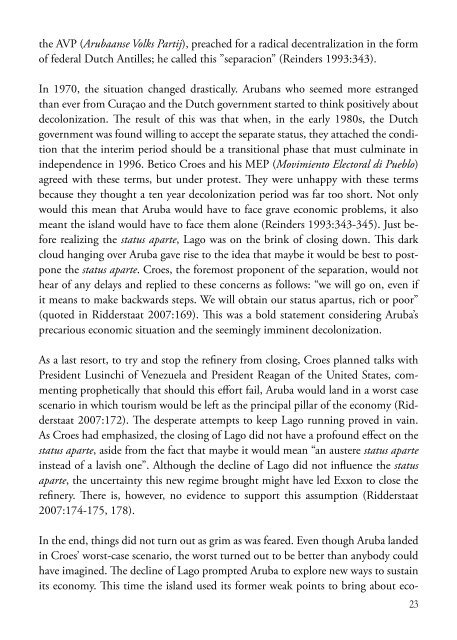Aruba navigating globalizing world.pdf - sociology-of-development
Aruba navigating globalizing world.pdf - sociology-of-development
Aruba navigating globalizing world.pdf - sociology-of-development
Create successful ePaper yourself
Turn your PDF publications into a flip-book with our unique Google optimized e-Paper software.
the AVP (<strong>Aruba</strong>anse Volks Partij), preached for a radical decentralization in the form<br />
<strong>of</strong> federal Dutch Antilles; he called this ”separacion” (Reinders 1993:343).<br />
In 1970, the situation changed drastically. <strong>Aruba</strong>ns who seemed more estranged<br />
than ever from Curaçao and the Dutch government started to think positively about<br />
decolonization. The result <strong>of</strong> this was that when, in the early 1980s, the Dutch<br />
government was found willing to accept the separate status, they attached the condition<br />
that the interim period should be a transitional phase that must culminate in<br />
independence in 1996. Betico Croes and his MEP (Movimiento Electoral di Pueblo)<br />
agreed with these terms, but under protest. They were unhappy with these terms<br />
because they thought a ten year decolonization period was far too short. Not only<br />
would this mean that <strong>Aruba</strong> would have to face grave economic problems, it also<br />
meant the island would have to face them alone (Reinders 1993:343-345). Just before<br />
realizing the status aparte, Lago was on the brink <strong>of</strong> closing down. This dark<br />
cloud hanging over <strong>Aruba</strong> gave rise to the idea that maybe it would be best to postpone<br />
the status aparte. Croes, the foremost proponent <strong>of</strong> the separation, would not<br />
hear <strong>of</strong> any delays and replied to these concerns as follows: “we will go on, even if<br />
it means to make backwards steps. We will obtain our status apartus, rich or poor”<br />
(quoted in Ridderstaat 2007:169). This was a bold statement considering <strong>Aruba</strong>’s<br />
precarious economic situation and the seemingly imminent decolonization.<br />
As a last resort, to try and stop the refinery from closing, Croes planned talks with<br />
President Lusinchi <strong>of</strong> Venezuela and President Reagan <strong>of</strong> the United States, commenting<br />
prophetically that should this effort fail, <strong>Aruba</strong> would land in a worst case<br />
scenario in which tourism would be left as the principal pillar <strong>of</strong> the economy (Ridderstaat<br />
2007:172). The desperate attempts to keep Lago running proved in vain.<br />
As Croes had emphasized, the closing <strong>of</strong> Lago did not have a pr<strong>of</strong>ound effect on the<br />
status aparte, aside from the fact that maybe it would mean “an austere status aparte<br />
instead <strong>of</strong> a lavish one”. Although the decline <strong>of</strong> Lago did not influence the status<br />
aparte, the uncertainty this new regime brought might have led Exxon to close the<br />
refinery. There is, however, no evidence to support this assumption (Ridderstaat<br />
2007:174-175, 178).<br />
In the end, things did not turn out as grim as was feared. Even though <strong>Aruba</strong> landed<br />
in Croes’ worst-case scenario, the worst turned out to be better than anybody could<br />
have imagined. The decline <strong>of</strong> Lago prompted <strong>Aruba</strong> to explore new ways to sustain<br />
its economy. This time the island used its former weak points to bring about eco-<br />
23


